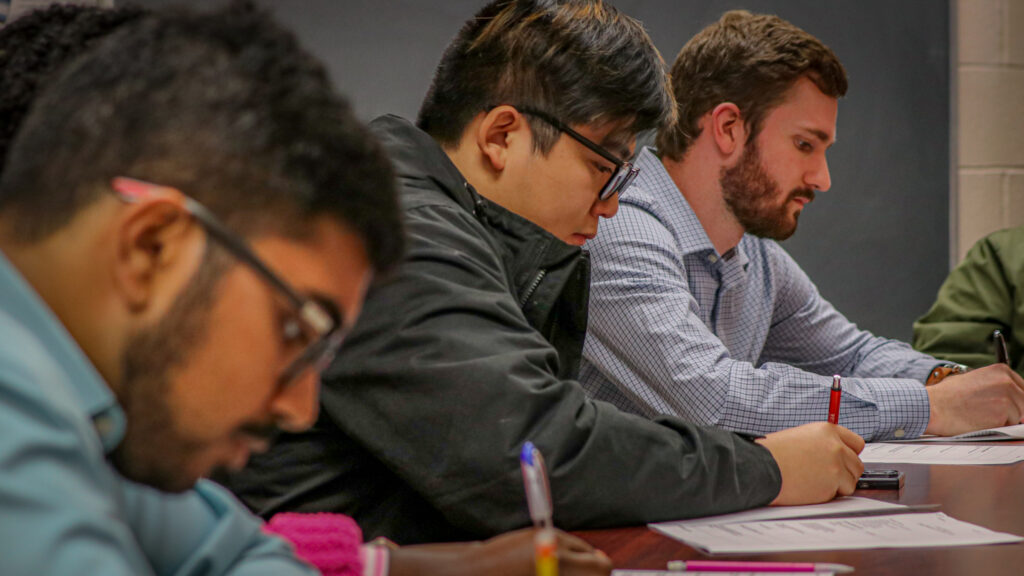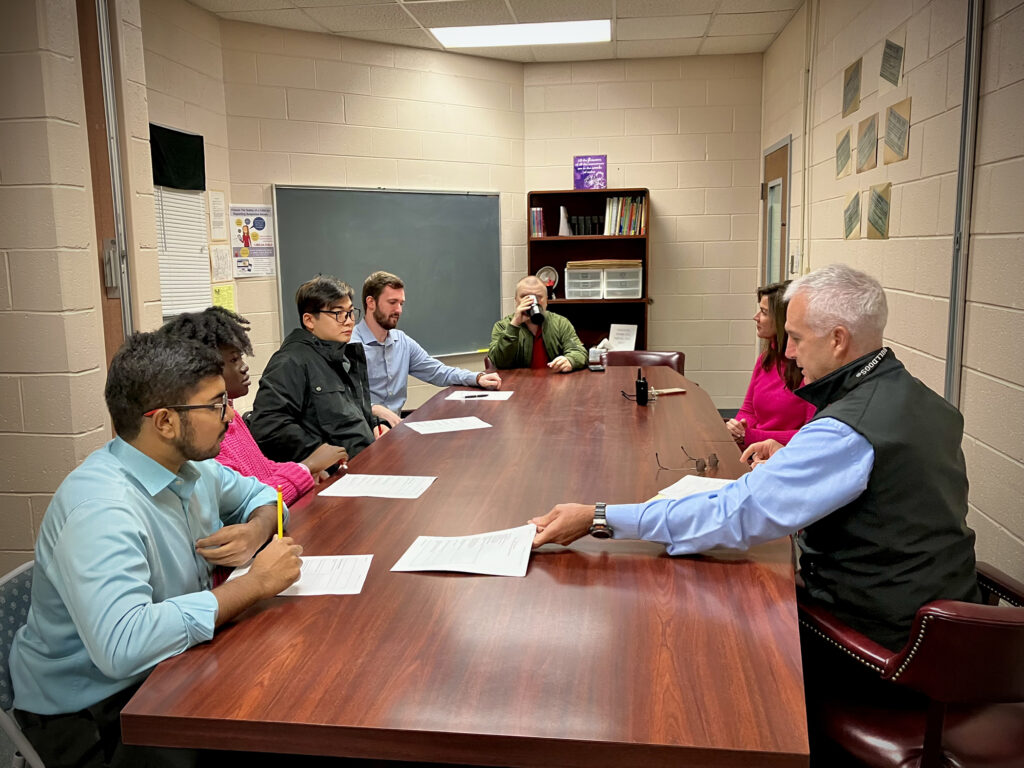Local governments, K-12 school systems and rural hospitals looking to strengthen their cybersecurity are working with University of Georgia students to get a more comprehensive picture of how equipped their organization is to deal with online threats.
Through CyberArch, UGA is addressing the challenges of cybersecurity for Georgia’s communities and businesses by helping these organizations build a broader awareness about cybersecurity threats and strengthen their cyber preparation and response actions. Student interns, working in teams of four, conduct a cybersecurity risk review through a series of assessment questions, then make a site visit before creating a final report that includes recommendations to enhance the organization’s cybersecurity posture.

Students in the CyberArch program work on a project for a CyberArch client. (Photo by Sherrie’ Raleigh)
“The UGA CyberArch program is making an impact by providing a valuable service to our partner organizations and serving as another resource for Georgia communities,” said UGA CyberArch coordinator Mark Lupo, a senior public service associate at UGA’s Carl Vinson Institute of Government. “Our goal is to train and empower students interested in pursuing careers in cybersecurity so that they can help meet the growing demand for skilled cybersecurity professionals while strengthening the cybersecurity infrastructure across Georgia.”
The program is facilitated by UGA’s Carl Vinson Institute of Government, a unit of UGA Public Service and Outreach, and includes students from the College of Engineering, Department of Computer Science, the Institute for Cybersecurity and Privacy and the Terry College of Business. Students also earn experiential learning credit.
Disha Adama, a management information systems and pre-law major from Johns Creek, was drawn to UGA CyberArch in part because it amplifies UGA’s research and service focus.
“Just being able to work with a local community and have an impact on them as a student with something as big and impactful as cybersecurity is really rewarding,” said Adama, who serves as a team leader.

Students in the CyberArch program begin a risk assessment project for a CyberArch client. Mark Lupo (right, blue shirt), senior public service associate at the UGA Vinson Institute of Government, coordinates the CyberArch program. (Photo by Sherrie’ Raleigh)
UGA CyberArch focuses on the city and county government, K-12 school system and rural hospital sectors because of their higher profiles, vulnerability and lack of financial resources, said Lupo.
For example, cyber criminals target local governments because of inadequate cybersecurity levels often caused by financial constraints, according to a recent report by the International City/County Management Association. UGA CyberArch is free for participating organizations, providing a total value of approximately $60,000 to $180,000 from six teams working over a semester.
Partner organizations also remain confidential, adding another layer of security to the program.
“CyberArch was very helpful in finding weaknesses we still need to work on, and has provided our team with valuable information,” said a director of information technology at a partner organization in McDuffie County.
The current intern group will work with partners in Floyd, Gordon, Oglethorpe, Spalding and Thomas counties.
UGA CyberArch started in fall 2017 as a pilot program within the Office of the Vice President for Public Service and Outreach, bringing together academic and public service faculty to develop a plan on how best to approach community cybersecurity outreach. Student participation was added in spring 2022 with eight interns. By fall 2022, there were 24 interns and the program was under the UGA’s Carl Vinson Institute of Government. The first two groups of interns worked with organizations in the UGA Archway Partnership communities of Burke, Washington, McDuffie, Pulaski and Colquitt counties. Archway is another unit of UGA Public Service and Outreach.
“We’re learning, and we’re giving organizations the resources to improve their cybersecurity posture,” said Hayat Cue Abdulla Asad Cue, a second-year graduate student in electrical and computer engineering who joined UGA CyberArch in spring 2022 and now works as the program’s graduate assistant.
In addition to learning about cybersecurity best practices, UGA CyberArch interns acquire skills that may help them pursue a cybersecurity career, providing a workforce development component. One partner organization already has expressed interest in hiring a summer intern from UGA.
Tucker Copeland, a fourth-year student from Columbus, is leading the UGA CyberArch website development and plans to go into the cybersecurity field after earning his bachelor’s degree in computer science later this year.
“Hopefully, I can use the knowledge and experience I gained from this program to be a bridge between the technological side and the people side,” said Copeland.








